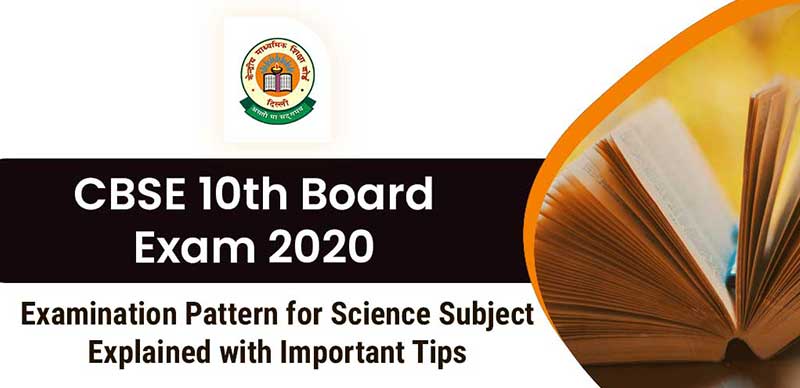
SHARING IS CARING
If our Website helped you a little, then kindly spread our voice using Social Networks. Spread our word to your readers, friends, teachers, students & all those close ones who deserve to know what you know now.
CBSE 10th Board Exam 2020: Examination Pattern for Science Subject Explained with Important Tips
The Central Board of Secondary Education (CBSE) will conduct the Class 10 Science board examination in February-March 2020. With only few months left for the examination, it is the time when students should start their exam preparations in a more effective and careful manner than before.
They should have a clear idea of the examination pattern and format of question paper so that they may prepare the right study and revision plan to score maximum marks in exams. We are providing here an insight into the examination pattern of class 10 Science subject which will make you aware of all necessary details related to question paper design, type of questions, marking scheme and weightage of different chapters for CBSE Class 10 Board Exam 2020.
CBSE class 10 Science exam pattern for board exam 2020 is explained below:
CBSE class 10 Science exam will comprise of two components; board examination (theory) of 80 marks and internal assessment of 20 marks. Internal assessment will be conducted through different activities as mentioned below:
|
1. Periodic Assessment (5+5) |
10 Marks |
|
2. Subject Enrichment (Practical Work) |
05 Marks |
|
3. Portfolio |
05 Marks |
CBSE has recently announced that the Class 10 Science theory paper will be conducted on the basis of syllabus prescribed by the board for current academic session. For board exam 2020, Science question paper pattern has been revised with the introduction of more number of objective type questions and increase in total number of questions from 27 to 30. Structure of Science question paper is as follows:
- CBSE Class 10 Science question paper will have 30 questions in all. These questions will be divided into three sections; A, B and C.
- Section A will have 14 objective type questions comprising MCQs, VSA type and assertion-reason type questions carrying 1 mark each.
- Section B will have 10 very short answer type question carrying 3 marks each.
- Section C will have 6 long answer type questions carrying 5 marks each.
- Question paper will have no overall choice. However, internal choices will be provided in all three sections of paper.
Note: This question paper design is totally based on the latest CBSE Class 10 Science Sample Paper 2020. CBSE has released this sample paper to reveal the question paper design for Board Exam 2020. Analysis of previous years board exams suggests that the board question papers are designed in exactly the same format as that of the sample papers released in the same year.
CBSE Class 10 Science Unit-wise Weightage for Board Exam 2020
Knowing the weightage of chapters and units for board exams is considered as an important aspect of understanding the examination pattern. It helps you know that on which chapters you need to emphasise more as compared to others. We have provided below the names of units from class 10 Science curriculum and how much they will weigh for board exam 2020:

This CBSE syllabus also specifies the list of experiments and other particulars required for board exam preparations.
After knowing the examination pattern, it’s important that students make a proper study plan and work in the right direction to obtain good results in board exam.
Important tips to make effective preparation for CBSE Class 10 Science Exam 2020:
- Read NCERT book thoroughly: First and major thing you need to consider while preparing for exam is focusing on NCERT book and reading all chapters thoroughly. All the questions in class 10 Science exam will be from NCERT book. Practice all questions and examples given in this book.
- Practice with NCERT exemplar problems: In CBSE exams, questions of higher difficulty level are generally taken from NCERT exemplar book. So, it is good if you practice all the exemplar problems and learn the right approach to attain correct solutions for all of them.
- Solve sample papers and question papers: It is the best way to assess your knowledge and strengthen your concepts and basics. Moreover, it also gives you an idea of the problems and difficulties you may encounter while solving/answering questions in exam. So, you can have the right preparations to avoid those problems and write your exam appropriately.
- Write down important reactions, definitions and diagrams: While learning each chapter, make note of main reactions, equations, definitions, formulas and diagrams as it will help you revise them quickly at the time of examination. Writing with pen and papers also helps in memorizing things easily.
In last, the most important thing to consider while preparing for the board exams is to be focused and attentive towards the preparations so that you don’t have to suffer with excessive exam pressure in last days before exams due to being underprepared. So, make the most of this time with right study.







 Profile
Profile Signout
Signout














 Quiz
Quiz
 Get latest Exam Updates
Get latest Exam Updates 










